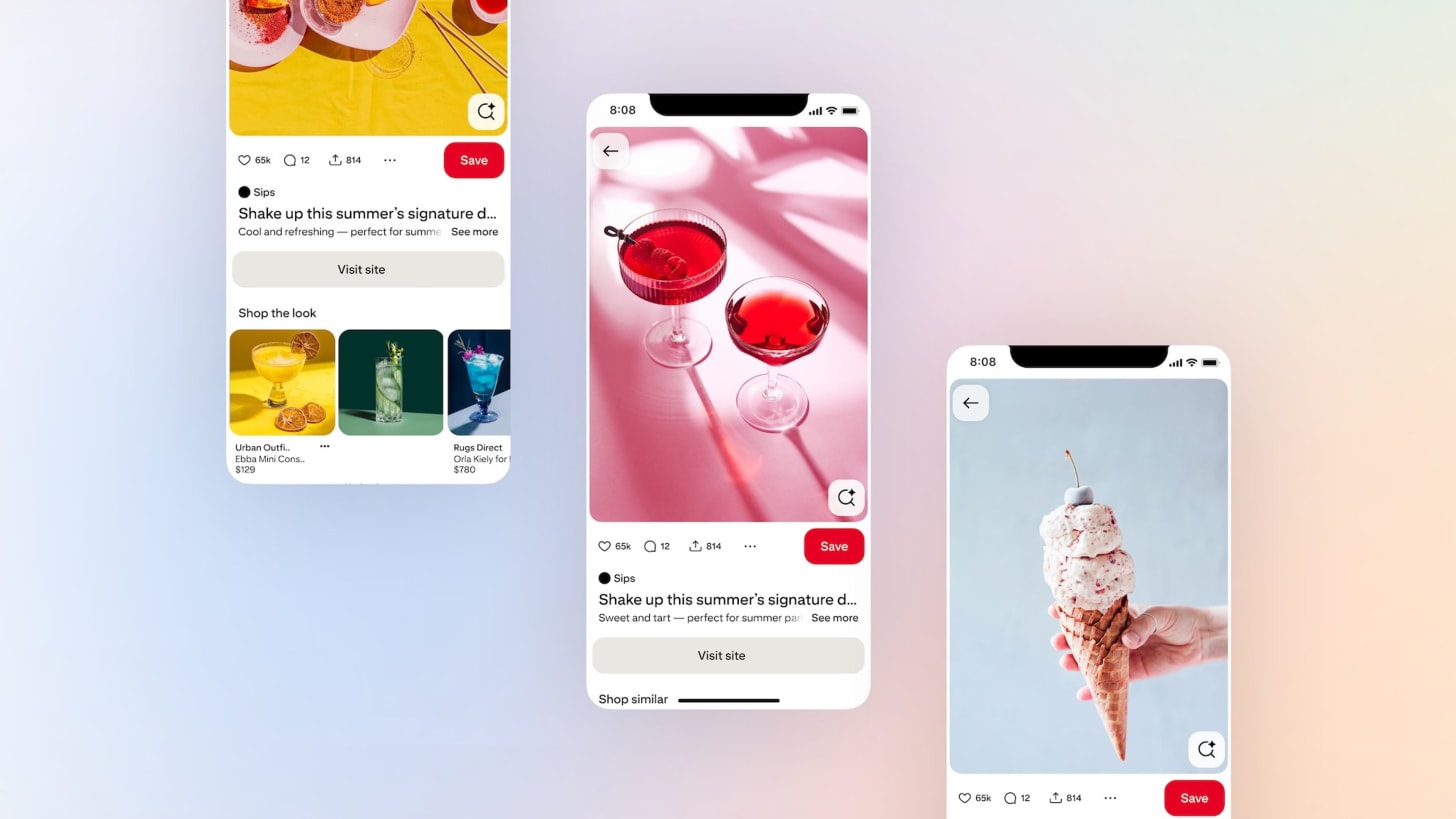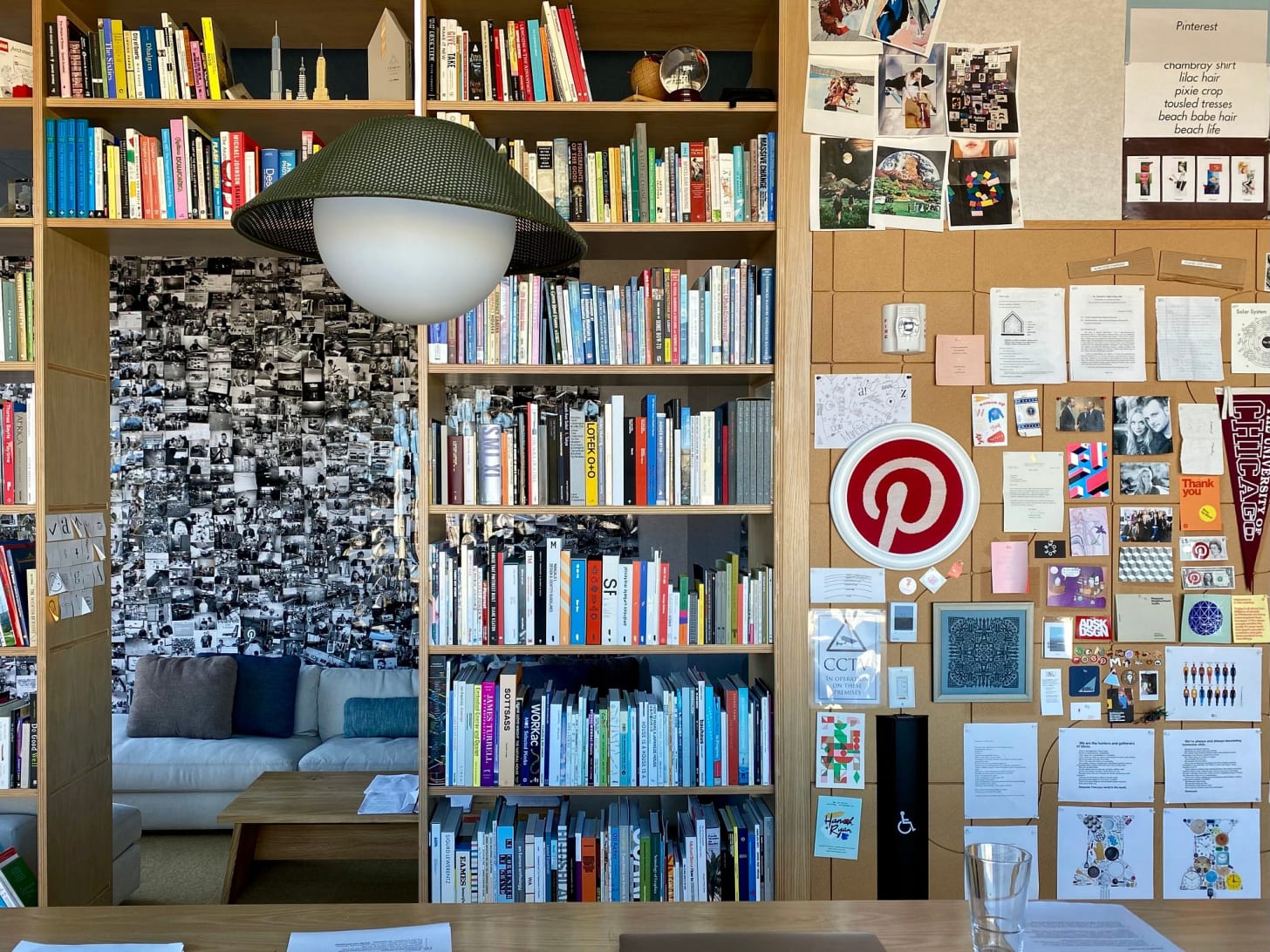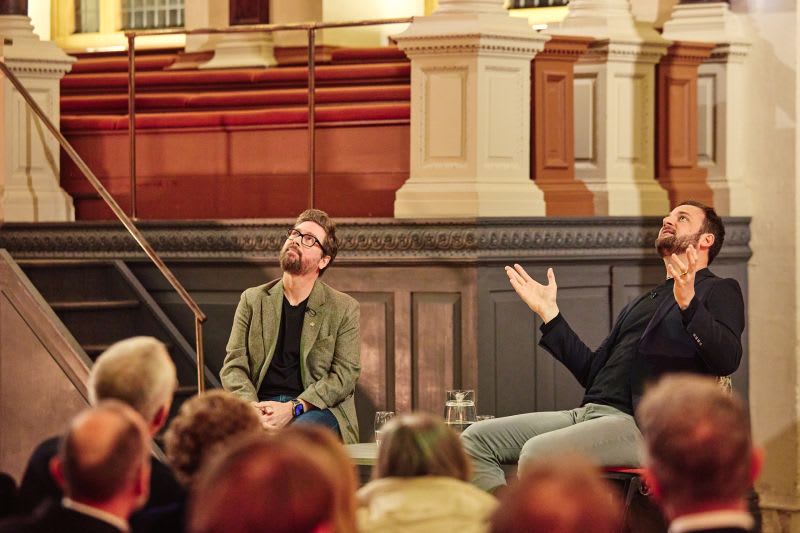Evan joined our design team at Facebook in 2009. One of my first memories is him asking if he could keep working on a side project. We told him, “your whole life is about to be consumed by working here, but if you want to find time on nights and weekends, by all means.”
Well, eight months later, the tables had turned. I noticed Facebook employees spending time not on Facebook, but on his side project: Pinterest. For a company building a product notorious for amassing attention, it was wild to see another product take that attention away from inside the company.
When Evan told me he wanted to leave to work on Pinterest full time, I didn’t sugarcoat it: “Evan, you may be making the biggest financial mistake of your life.” He did it anyway.
Well, Pinterest went on to become one of the most successful and impactful design-centric companies in tech, with projected revenue of over $4B in 2025 and over 500 million people who use it to curate their aspirations and plan their life. So yeah, it turned out not to be the biggest financial mistake he’d ever make.
Evan eventually left Pinterest in 2021, and is now building West Co. to create tools that help people live meaningful, connected lives. Drawing from religious traditions and communal rituals, he’s asking a different question than most founders: what if a company’s operating system was built for care as much as productivity?
This thread pairs with another pattern that has defined his critical career decisions: choosing love over logic. From walking away from Facebook to betting on ideas that felt irrational but deeply compelling, he has consistently shown the power of conviction.
We spoke about business value of caring, design’s ability to create gravity around new ideas, and how his new company harnesses the power of congregation to rebuild some of the human connection that's been lost in our digital age. Hope you enjoy.
Are you a designer building something new, or know someone who is?
We’re always looking for more designer founders to feature, invest in, or partner with.
“The whole time at Facebook, all I wanted to do was go work on Pinterest,” Evan reflects. “After a year, I decided that if I loved it that much, I should be working there full time. I let that lead my decision, and it worked out. It could easily not have worked out, but I wasn’t afraid.”
Walking away from potentially life-changing money to bet on Pinterest was “irrational,” he admits. But it established a pattern that would define his career: choosing love over logic, and internal pull over external pressure.
More than youthful idealism, Evan had learned that the most compelling products come from solving problems you feel viscerally. Pinterest succeeded because he and Ben were building something they desperately wanted to exist, not something they thought the market needed.
“You have to make yourself fall in love with something enough that you’re willing to overcome your fear. You have to fall in love with the idea of investing an irrational amount of energy and money and time or whatever it is into this thing. If you find something you love that much, you kind of need that amount of love to stick it out. It takes a lot of intrinsic motivation to see through the ups and downs and challenges.”
For first-time founders, hiring and managing leaders with far more experience than yourself can be daunting. Evan found himself at 27, having never managed anyone, suddenly overseeing accomplished VPs from Google and other tech giants. The instinct is to defer or second-guess your authority: “On some level, I had this self-awareness of: I don’t know what I’m doing. I should not be managing this person.”
But your lack of management experience isn’t necessarily a weakness. As Evan discovered: “I understand the soul and spirit of this product and its values at a level of depth that others never will, because they didn’t give birth to it and haven’t been invested in it like I have.”
Evan’s advice on leading with confidence as a founder:
Don’t discount what you know: “If I could go back, I would give Ben and myself a huge injection of confidence, to know that our values were the right values.”
Teach the business value of caring: “I spent years trying to learn how to make a logical case for design. I finally realized it’s about helping your team learn the business value of caring, and figuring out how to structure your team so they can make design-centric decisions in a way that empowers them.” One example of this philosophy in action is how the team redesigned the business onboarding flow to better serve small businesses alongside larger brands.
Lean on mentors: “If you’re working with a mentor, reach out when you need help and don’t self-censor. Often people are very nervous. It’s kind of like being in high school and texting the person you have a crush on. You overthink every interaction. That dynamic manifests often in these professional mentorship relationships. It’s understandable, and it’s also just a waste of energy.”
That confidence Evan found as a young founder became essential as he helped shape Pinterest into a truly design-centric company. When we previously asked how the company achieved this, Evan explained:
“The trick for us is to build a company that makes money as a result of every single one of our disciplines operating at the highest level. Building a product in service of a business is the only way to make something long, long, long term. Like people say, Apple is a design company, which it is, but really that means everyone is doing an amazing job at their craft. We’re trying to tie the value of our product to every function - engineering, design, support, content, marketing, sales, all of them - doing high-quality work.”
Design’s superpowers are threefold, according to Evan:
Care that users can feel: “What I think it comes down to is just care. I see that with other founders like Brian Chesky at Airbnb. When you use a product and you can just tell that someone cared about your experience. Did they care about you as a user? What parts of you did they care for?”
Inventing new products in new spaces: “There are so many products that have never been invented that could really help people. Designers have the ability to do this. If you can find that kind of idea, you get to build a very different kind of company. It’s not just chasing some market share and some existing thing, it’s creating new market share.”
Generating gravitational pull that draws the right people in: “One of the superpowers of design is creating desire.” Instead of filling funnels with prospects and optimizing conversion rates, “with design, you can refine something you’re in love with, and it develops a gravity. People start to show up out of nowhere to work on it because it has this draw, this pull. It’s so in a designer’s power to sit down and make something beautiful that brings people in.”
💡 Look for the “disciples of why.”
Evan uses this phrase to describe mission-driven people already captivated by the question your product is trying to answer. “Designers tend to be more loyal to humanity than to any given company,” he says. They don’t need convincing; they feel it viscerally. When searching for a co-founder or people to join your team, look for:
People who’ve worked in or researched your problem space
Side projects or open-source work in the same domain
Motivations rooted in why the problem matters, not just what the solution is

“One of the least discussed chapters is leaving your company. Many founders wait too long. It feels scary to step out of the story that has made you successful and move into a complete unknown.”
Even as Pinterest flourished under these principles, Evan found himself at another crossroads. Despite the company’s massive success, he felt called to step away and grow as a designer and product builder. In a move that echoed his earlier leap from Facebook, Evan left Pinterest in 2021 to return to the fundamentals of craft, learning and rebuilding his approach to design from the ground up.
Once again, it was a move driven by internal conviction rather than logical reasoning: “Because I had never finished architecture school, I had felt like I’d never truly learned my design craft. I’d always dreamed of learning under somebody whose craft I respected, soaking in their process, their values, and their way of working. What does that way of working feel like?”
Evan’s advice on knowing when to leave:
Test if you love an idea enough to overcome fear: “You have to fall in love with something enough that you’re willing to overcome your fear. You need that amount of love to stick it out.”
Listen to your need for growth: His decision came from the feeling that, despite building an incredibly successful company, he’d never fully developed his design craft. If you don’t see yourself growing in the ways that matter to you as a founder, it may be time consider a new path.
Don’t wait for logic to give you permission: Both of Evan’s leaps - leaving Facebook, then Pinterest - looked irrational from the outside, but were guided by a steady internal compass. “I was taught to follow my curiosity and I was pretty uncompromising about that. I made a series of pretty poor (on paper) financial and career decisions that ended up working out for me.”
“Curiosity has helped me be successful, whatever that means, more than any other quality.”

This pattern of following internal conviction over external logic led Evan to his most ambitious project yet. In recent years, his exploration of consciousness and spirituality led him to ask:
“What could I build that might help address just some of the terrible devastation of the human mind and heart that we’ve wrought in the last 15 years? I was so in love with the idea of trying to build something around that that I decided to bring together a small team and see what we could do.”
Rather than looking for answers in the present, he turned to history, as Notion’s Ivan Zhao has also done. “Most of the people I know in Silicon Valley are thinking from the perspective of a very zoomed-in timescale. They’re thinking about this year, or the next five years. When you zoom out, you have so much more context on what’s happened and why.”
That zoomed-out view revealed that “a lot of wisdom is also stored and transmitted by the world’s great religions and spiritual traditions. Specifically in the United States, it’s been stored and disseminated through the technology of congregation. Congregation has really fallen apart in the last few decades. We f*cked it up with the phone.”
Seeing this gap between ancient wisdom and modern disconnection, Evan knew he’d found something he could fall in love with enough to overcome his fear of starting over. His new company West Co. - started with Twitter co-founder Biz Stone and an impressive team of designers, technologists, and scientists - is building tools that strengthen our inner lives and revive that lost art of congregation.

That philosophy starts within the company’s own culture. At West Co., the team operates in two key ways: First, they weave time-honored practices into their daily work, connecting their personal growth and wisdom to what they’re building. Second, they live their mission: if the goal is helping people lead more purposeful lives, then the company itself must embody that same intentionality in how it operates.
Here’s what those principles look like in practice:
Connecting the rhythms of work with the rhythms of nature by planning around seasons (e.g. spring, summer) instead of quarters
Attending to how they want to be together by reflecting on shared commitments as a team
Connecting life and work by meeting every couple of weeks in small groups
Cultivating awareness of longer time frames and lineages by sharing photos of ancestors and lighting a candle each day
By rooting their culture in these intentions, West Co. aims to foster care, connection, and purpose - reminding us that even in tech, the deepest sources of wisdom may be found by looking back.
In many ways, these practices trace back to a collaborative project Evan had been part of years ago, where hundreds of rituals and practices from religious and cultural traditions around the world were cataloged in a spreadsheet. For a deeper dive into this research, you can take a look at the spreadsheet here.
“Now we’re entering a time where we don’t remember that the point of life is to be in synchrony with the world around us, and we have a real risk of pushing the planet to a terrifying place. It’s time to cast off that spell of the Industrial Revolution and reintegrate with an older way of working.”
Looking across Evan’s journey, from Pinterest’s focus on inspiration to West Co.’s spiritual technologies, there’s a consistent thread. His approach is a reminder that the most enduring work is rooted in genuine attention and a commitment to serve others.
“Craft is just work with care,” he explains. “You can make something, but if you really care about it, you’ll craft it. Craft is the word that, to me, embodies care.”
Looking ahead, he’s clear about what matters most:
“I think future me will have wanted me to do my best to serve people and to treat everybody well along the journey in building something I feel genuinely proud of.”
It’s a philosophy that challenges the typical Silicon Valley narrative of growth at all costs. Instead, Evan suggests something more radical: that building with genuine care and following what you love might not only create better products, but better companies, and perhaps, a better world.
Care is the foundation of great design. Craft is simply care made visible, and users can feel it. Evan emphasizes that showing genuine care is more persuasive than abstract arguments about design’s value.
Confidence shapes leadership. Evan wishes he and Ben had trusted their instincts earlier. Owning their values would have empowered their teams and reduced the tendency to defer to outside experts.
Designers can create gravity. Prototypes make ideas real and desirable, drawing in co-founders, hires, and collaborators. This pull is often stronger than abstract recruiting or pitch decks.
Rituals can transform culture. At West Co. the team plans by the seasons, reads a covenant, meets in small groups, and honors an ancestor table. These simple practices reconnect work with larger rhythms and meaning.
Founders must love their idea irrationally. Evan left Facebook for Pinterest not because it was logical, but because he loved it. That love provided the persistence needed to endure years of uncertainty.
Hero illustration by Adam Dixon.
.png)






